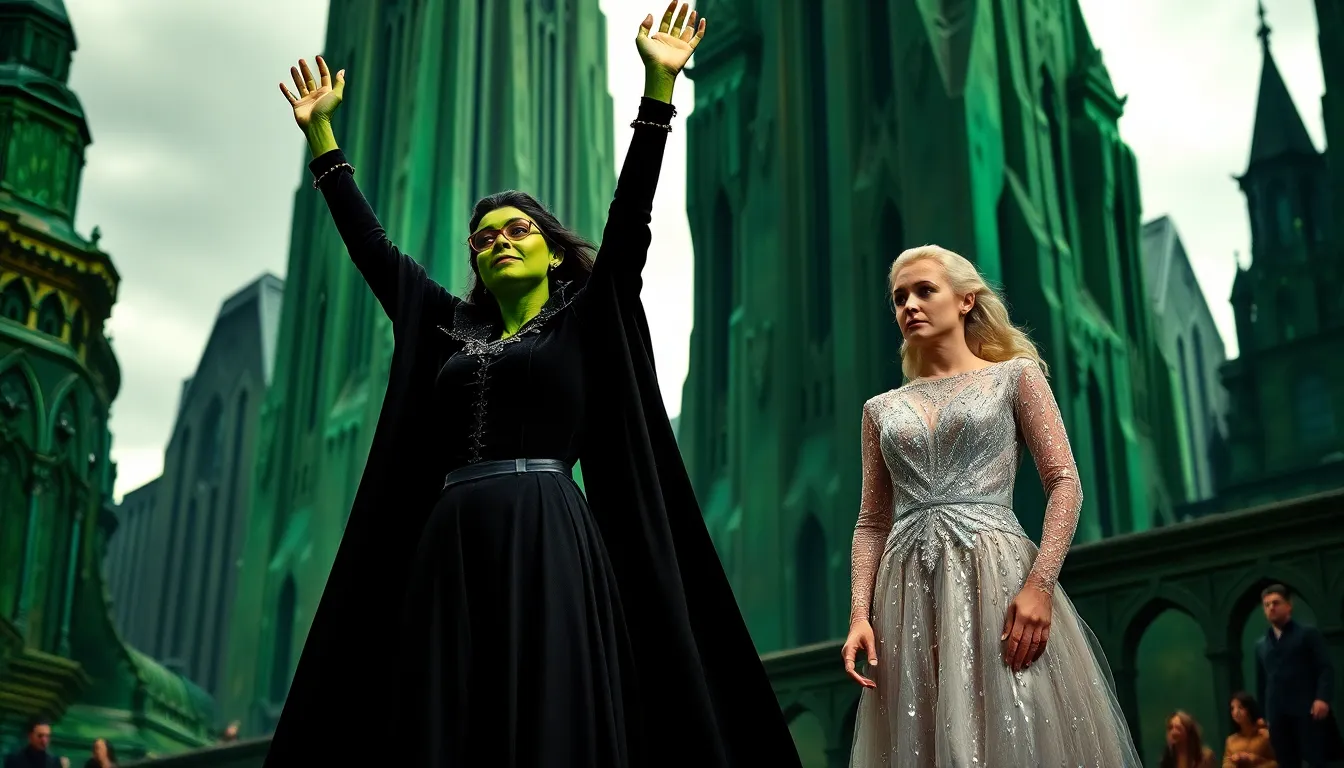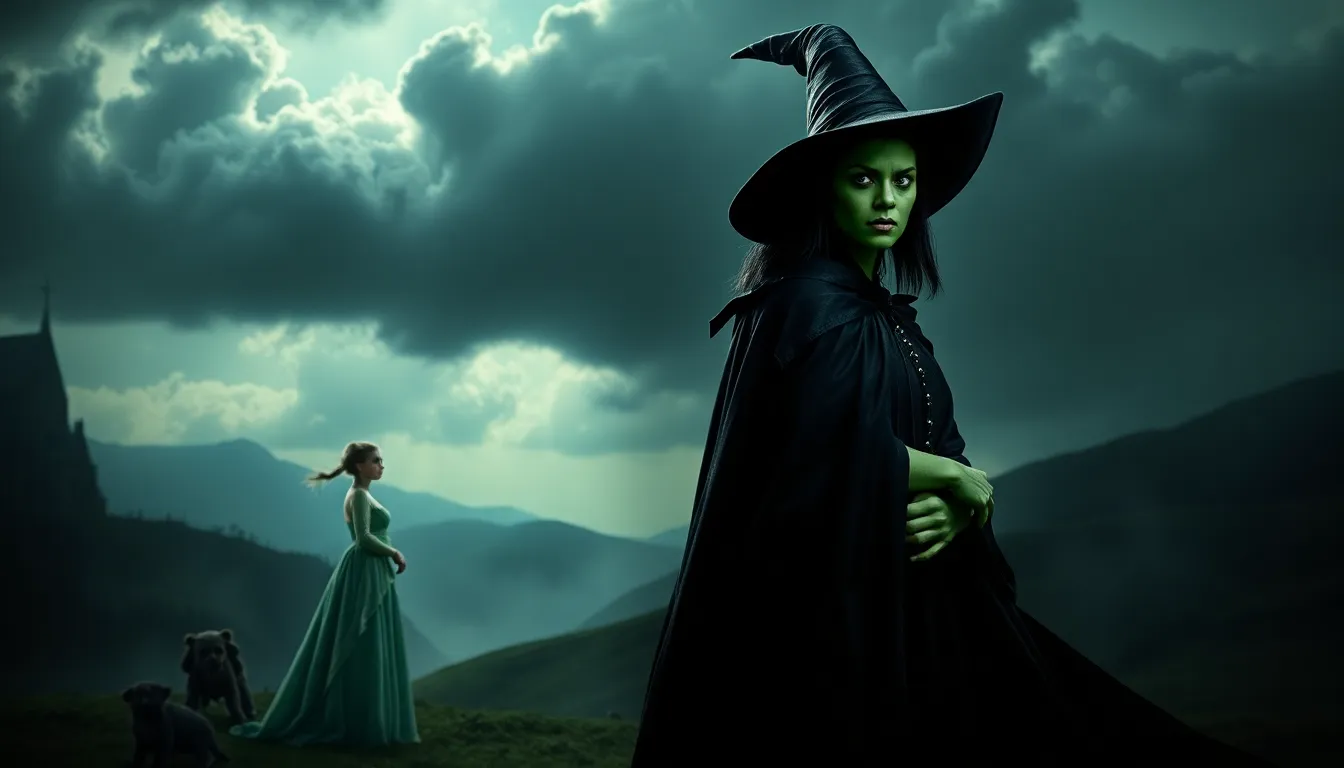Table of Contents
ToggleIn Act 2 of Wicked, the story takes a darker turn as the complexities of friendship and power unfold. Elphaba, the misunderstood green witch, grapples with her identity and the consequences of her choices, while her bond with Glinda faces intense challenges. As political tensions rise in Oz, the stakes become higher, leading to pivotal moments that redefine their destinies.
This act delves into themes of loyalty, betrayal, and the struggle for acceptance. It reveals how Elphaba’s quest for justice clashes with the expectations placed upon her, forcing her to confront the harsh realities of a world that often misunderstands her. With captivating musical numbers and emotional character arcs, Act 2 captivates audiences, leaving them eager to discover the fate of these iconic characters.
Overview of Wicked Act 2
Wicked Act 2 presents a shift from lighthearted elements to darker, more intense themes. Elphaba’s character continues to evolve, revealing her determination to fight injustice while navigating betrayal and political strife.
The act highlights key events, such as Elphaba’s growing isolation due to her defiance against the corrupt government of Oz. As she becomes known as the “Wicked Witch of the West,” her intentions remain misunderstood. Glinda, on the other hand, grapples with her own ascent in society, often at the cost of their friendship.
Musical numbers further enhance the emotional weight of Act 2. Songs like “No Good Deed” illustrate Elphaba’s internal struggles and her conviction in pursuing justice despite the consequences. The powerful performances resonate with audiences, underscoring the complexities of loyalty and love.
Political tensions escalate throughout Act 2 as the Wizard solidifies his control over Oz, leading to significant conflict. Themes of power misuse and the fight for autonomy come to the forefront, compelling characters to confront their moral convictions.
Elphaba’s conflict with the Wizard and her choice to reject authority deepen her role as a revolutionary figure. Meanwhile, Glinda’s choices reflect the compromises individuals often make for acceptance and status.
As the act unfolds, characters face moments of vulnerability, challenging their relationships and beliefs. The intertwining storylines solidify the bond between friendship and ambition, leaving audiences questioning the true nature of good and evil.
Key Plot Developments

Act 2 of “Wicked” showcases significant character transformations and the impact of personal choices amidst political turmoil. The evolving dynamics between Elphaba and Glinda drive the narrative forward, emphasizing their contrasting journeys.
Elphaba’s Transformation
Elphaba undergoes a profound transformation in Act 2 as she embraces her identity as a powerful figure in Oz. Facing mounting social isolation, she becomes increasingly resolute in her fight against injustice. Her confrontation with the Wizard symbolizes her rejection of authoritarian control, marking her as a revolutionary. As Elphaba performs “No Good Deed,” audiences witness her internal conflict and commitment to her ideals, despite the risk of being seen as villainous. This act solidifies her role as the “Wicked Witch of the West,” showcasing her shift from misunderstood outsider to a fierce advocate for the oppressed. Her defiance highlights the courage to stand against societal norms, deepening her complexity as a character.
Glinda’s Choices
Glinda’s choices significantly impact her relationship with Elphaba and her aspirations. As Glinda gains popularity and influence, she navigates the delicate balance between ambition and loyalty. Her decisions often reflect a desire for acceptance in the eyes of society, even at Elphaba’s expense. Through her interactions with the Wizard and the ruling elite, Glinda wrestles with her identity, ultimately questioning the morality of her path. This internal struggle is evident when she chooses appearances over genuine friendship, forcing her to confront the price of her ambition. Glinda’s journey illustrates the sacrifices one makes for societal approval, creating a poignant contrast to Elphaba’s unwavering commitment to justice.
Character Relationships
Act 2 of “Wicked” examines the intricate relationships between the characters, primarily focusing on Elphaba, Glinda, and Fiyero. These dynamics reveal the emotional complexity and underlying tension as they navigate their individual paths.
Conflict Between Elphaba and Glinda
Conflict escalates between Elphaba and Glinda as political tensions rise in Oz. Elphaba becomes increasingly committed to her ideals of justice, while Glinda’s aspirations for social acceptance lead her down a different path. Their friendship strains as Glinda makes choices that prioritize her popularity over loyalty, causing Elphaba to feel betrayed. Misunderstandings and differing priorities exacerbate their conflict, illustrating how ambition can fracture deep connections. As Elphaba transforms into the “Wicked Witch of the West,” Glinda struggles with her guilt and complicity, further widening the rift between them.
The Impact of Fiyero’s Decisions
Fiyero’s decisions significantly influence the dynamics between Elphaba and Glinda. His initial indifference shifts as he becomes drawn to Elphaba’s passion for justice, creating a love triangle that complicates their relationships. His choice to align with Elphaba represents a rejection of societal norms, positioning him as a catalyst for both empowerment and tension. As Fiyero grapples with his feelings, his choices create emotional turmoil that forces Elphaba and Glinda to confront their own desires and beliefs. Ultimately, Fiyero’s journey serves as a critical element in the transformation and development of the two central characters, further entwining their fates.
Themes Explored
Act 2 of “Wicked” delves deep into themes of friendship, betrayal, and the complexities surrounding good and evil. These themes shape character dynamics and highlight the moral dilemmas faced by the characters.
Friendship and Betrayal
Friendship becomes a central focus, particularly between Elphaba and Glinda. Their bond faces immense strain as loyalty conflicts with personal ambitions. Elphaba’s commitment to justice leads her to take radical actions, while Glinda’s pursuit of popularity often puts her at odds with Elphaba’s ideals. As Glinda embraces societal acceptance, Elphaba feels betrayed, highlighting how ambition can fracture deep connections. Their evolving relationship illustrates the struggle for authenticity in the face of external pressures.
The Nature of Good and Evil
The narrative forces characters to confront the ambiguity of good and evil. Elphaba, initially viewed as the “Wicked Witch,” embodies a fight against oppression, challenging the established definitions of morality. As she defies the corrupt Wizard, she embodies a revolutionary spirit, showcasing that true wickedness often lies within those in power. Glinda, while pursuing her aspirations, grapples with the ethical implications of her choices. This theme culminates in a rich exploration of identity, morality, and societal expectations, leaving audiences questioning conventional judgments of right and wrong.
Act 2 of “Wicked” deepens the exploration of its characters and themes. Elphaba’s transformation into the “Wicked Witch of the West” highlights her journey from misunderstood outsider to a fierce advocate for justice. The growing rift between her and Glinda underscores the tension between ambition and loyalty, forcing both characters to confront their choices and the implications of their actions.
As political strife escalates in Oz, the complexities of friendship and betrayal come to the forefront. The emotional depth of musical numbers like “No Good Deed” resonates with audiences, enhancing the narrative’s weight. Ultimately, Act 2 captivates with its rich character development and moral ambiguity, leaving viewers to ponder the true essence of good and evil amidst a backdrop of societal challenges.




